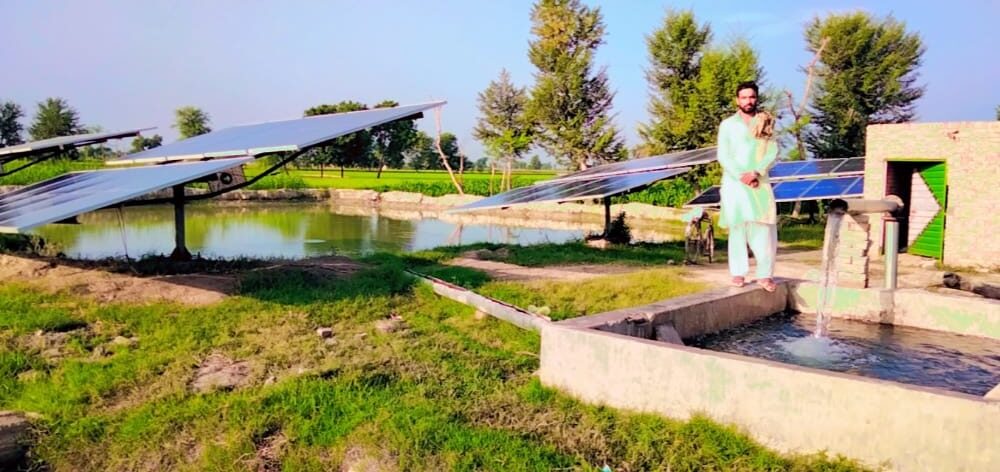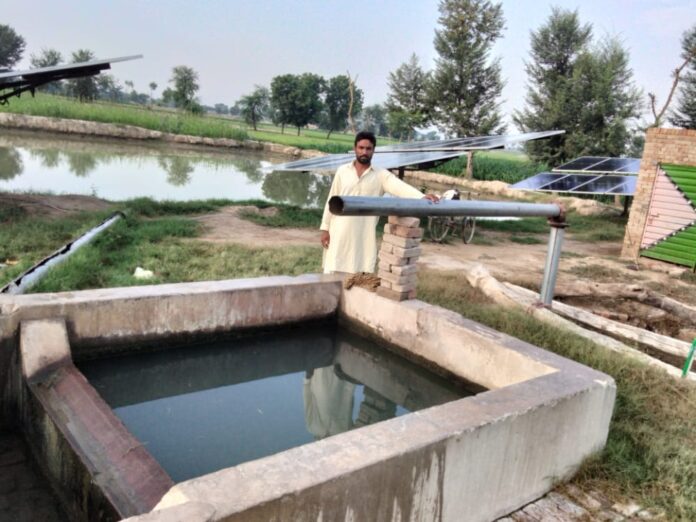Renewable energy in Pakistan is a relatively underdeveloped sector. However, in recent years, there has been increased interest to explore renewable energy resources for sustainable energy production. According to National Electric Power Regulatory Authority’s (NEPRA) 2020 yearly report, Pakistan’s total installed power generation capacity is 38700 MW, of which 57% of energy comes from thermal (fossil fuels), 31% from hydro, 4% from renewable (wind, solar and bagasse) and 8% from nuclear. Over the last five years, 19 wind power projects of 980MW, 6 solar power projects of 418MW, and 8 bagasse projects of a total of 258 MW achieved commercial operations and are providing electricity to the grid. Pakistan was also the first country to adopt the SDGs 2030 agenda through a unanimous resolution of the Parliament of Pakistan while maintaining an impressive overall Index score of 57.7 in 2021.
Utilizing renewable energy resources at domestic & commercial level is helping hundreds of individuals in sustaining their entrepreneurial ventures. Such is the story of Muhammad Yaqoob from Tehsil Burewala, District Vehari, who always knew that despite the myriad challenges that were sure to hinder his goals, he possessed the drive, ability, and aptitude to reach for the stars. Initially, much like most of interior Punjab, Yaqoob and his family of 8 struggled to make ends meet and lived hand to mouth.
Vehari is known nationally as the city of cotton. The agricultural growth rate has been constrained of late by shrinking arable land, climate change, water shortage, growing population, and irregular power outages. Increasing agricultural productivity, therefore, requires the adoption of new and sustainable technology-driven approaches and Yaqoob knew that harnessing the power of renewable energy through additional financial support was the solution for him.
As the sole breadwinner, Yaqoob lacked the financial resources to cultivate his land and purchase agricultural assets like fertilizers, seeds, pesticides, etc. He had no choice but to turn to private lenders in his locale to borrow money, only to bear heavy interest rates and unreasonable conditions such as sharing the annual crop yield and profits. Yaqoob was exploited deliberately by the lenders, who would unexpectedly change the terms and conditions of his loan, forcing him to eventually sell his crops to them at significantly lower fares than the market rate. He felt helpless and miserable throughout this time and was constantly on the lookout for alternative solutions to his troubles.

In 2017, a loan officer from Mobilink Microfinance Bank Limited (MMBL) visited and proffered the ‘Agri Plus Loan’, specifically designed to support agriculture and livestock farmers by providing low markup rates with easy installment plans to help enrich their ventures. The plan resonated with Yaqoob and he knew this would be a turning point for him. Upon his interest, MMBL’s staff further elucidated the application process, seamlessly engaging Yaqoob through seamless and efficient digital onboarding; Yaqoob received the amount much earlier than he expected.
Deployment of renewable energy technologies proved to be an ingenious solution to Yaqoob’s qualms as it helped him operate his machinery smoothly without adversely affecting the environment. He installed a solar-powered turbine to help irrigate his crops – an unconventional concept in the rural suburbs of Pakistan. However, Yaqoob is determined to spread awareness about its advantages in his village, especially among other farmers like him.
“I am grateful to MMBL for believing in me and my business through troubled times. The financial support I received from the Bank made my business successful despite the unfavorable outlook for the future.”, said Yaqoob when he completed his first loan cycle of PKR 500,000.
After acquiring the required agricultural resources required to cultivate his farm, his land bore ample yield that year, making him a handsome profit. His agricultural repertoire was building up, enabling him to timely pay off his loan installments while providing a comfortable lifestyle for his family and sending his children to school. Currently, Yaqoob is in his 5th successful loan cycle with MMBL, whereby he has secured PKR 1 Million for further expanding his venture. Now, with his business acumen, Yaqoob is generating monthly revenue of PKR 300,000.
Yaqoob is very passionate about preserving Earth’s ecosystem and believes that installing the solar plant on his land is the first step towards sustainable growth of his business with minimalized carbon emissions. “I wanted to set an example for my children and show them that successful businesses and preservation of the environment can go hand in hand. My business has gained substantially from the benefits of solar energy. Now I want to spread the knowledge to others around me.”
The agricultural sector is indispensable to Pakistan’s economic growth, contributing over 20% to the country’s Gross Domestic Product (GDP) and employing over 35% of the labor force. The recent flooding in Pakistan has destroyed wide swaths of agricultural land and as per the preliminary estimates, floods have inundated 7 million hectares out of 22 million hectares of total cultivated land which come to around 33%. This drives the urgent need to restore agricultural produce and invest heavily in the sector to support farmers. MMBL is at the forefront of this, with over 46% of its lending dedicated to this crucial segment.
MMBL is a subsidiary of VEON Ltd., which throughout its operations, strives to reduce its carbon footprint through a combination of resource optimization, behavioral changes, and technology innovation for a digitized economy. This has included a 38% reduction in CO2 emissions per unit of data traffic in 2020, as VEON’s investment in more energy-efficient, hybrid and renewable network equipment helped to mitigate the environmental impact of greater data use by its customers. VEON shares its industry’s ambition to achieve net-zero emissions by 2050 and is a strong proponent of using clean energy for fostering sustainable development. Similarly, MMBL has also digitalized most of its operations, going paperless in maximum processes and recycling resources to ensure sustainability at all tiers.
Success stories like Yaqoob resonate with our company’s commitment toward the attainment of the United Nations Sustainable Development Goals and are a testament to what financial inclusion truly means.


